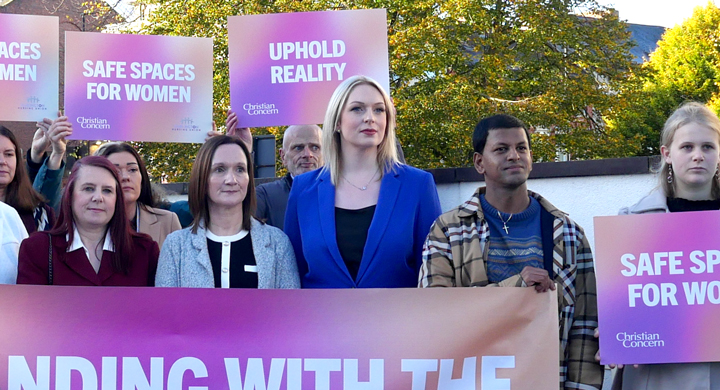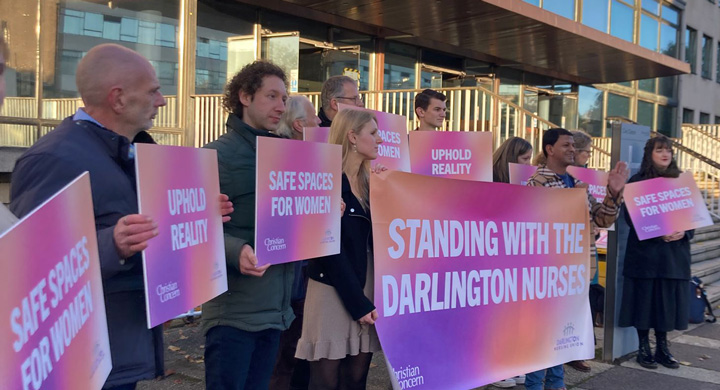NHS nurse Bethany Hutchison, a senior member of the Day Surgery Unit at Darlington Memorial Hospital, has given evidence in what is expected to be a landmark Employment Tribunal case against County Durham and Darlington NHS Foundation Trust.
On 23 October 2025, she delivered powerful testimony at the Newcastle Employment Tribunal, detailing her courageous stand, supported by lawyers at the Christian Legal Centre, against what she describes as an ‘unlawful policy’ and ‘institutional neglect’ of female staff.
Bethany’s witness statement outlines a principled and deeply personal journey to protect her colleagues, particularly vulnerable women, after repeated failures by NHS management to address serious safeguarding concerns.
While she has had to lead and remain strong for others, Bethany also spoke candidly about the emotional toll the case has taken on her and her young family.

A Tipping Point
Bethany, who has worked in the Day Surgery Unit since 2018, first became concerned upon learning that a male colleague, identifying as ‘Rose’, was using the female staff changing room.
A conversation with colleague Karen Danson became the catalyst for action:
“My colleague Karen Danson told me how she was in the changing room alone and was suddenly approached from behind by RH… Karen was extremely upset. She explained that earlier in her life, she had suffered sexual abuse from a male, and this situation was very traumatic for her.”
Bethany also shared how another female nurse had said about her experiences in the changing room with Rose:
“I felt like he was staring at my breast area…I quickly just chucked my jacket on, got my coat and ran out.”
Moved by Karen’s experience and other accounts, Bethany felt compelled to act. Citing her professional duty under the NMC Code to “act as an advocate for the vulnerable,” she had initially began raising concerns with senior staff in July 2023.
Despite multiple meetings with ward managers and HR, her concerns were dismissed.
A senior nurse at the time, who has since retired, told Bethany: “We had to accept this situation due to the inclusiveness of the NHS and Trust”.
Following further weeks and months of inaction, in March 2024, Bethany coordinated a collective letter to HR, signed by 26 nurses and healthcare assistants, with legal support from the Christian Legal Centre.
She ensured all signatories were informed and willing:
“I always followed up by telling them that there was no pressure to sign the letter… I felt that was more than enough for insisting that our voices should be heard.”
The Infamous Meeting
The Trust’s response was far from conciliatory.
A pivotal moment came on 15 April 2024, when her manager relayed the outcome of a sudden meeting with senior HR staff:
“[My manager] informed me that she had been told that ‘the Trust were in support of Rose’ and we (the 26 nurses who signed the letter) ‘had to be educated, broaden our mindset and be more inclusive’. To add insult to injury… [Trust’s Head of HR] suggested that RH should be the one to educate us.”
She continued that: “I realised that the management were not going to support us and were only going to label us bigots, unreasonable, unkind and ‘not inclusive’. I felt this was extremely unfair. This was the first time… I cried at work.”
Threats and intimidation
At this time, Bethany was also warned that her Nursing and Midwifery Council (NMC) pin could be at risk. She was told by a colleague that a Theatre Matron had said:
“Beth needs to be careful as she is putting her NMC pin at risk.”
Bethany interpreted this as a veiled threat, suggesting she could face professional consequences for speaking out.
“We felt the public had a right to know about the case which raised issues of public interest, especially because we suspected that similar things might be happening in other NHS trusts”, Bethany said.
After the nurses went public and launched legal action in June 2024, the situation escalated and what Bethany describes as a “campaign of intimidation” began.
However, posters appeared in the female changing room, including one on the door bearing the NHS logo and the words: “INCLUSIVE CHANGING SPACE.”
The nurses were told that their manager’s office would be converted into a ‘temporary’ locker room for any female who had an issue with getting undressed in front of a man to change in.
Bethany said: “I went to see the ‘locker room’ converted from Claire’s old office. At that time, the room had nothing in it except a chair and a hook on the back of the door. If we were to change in this room, we would have to leave our belongings in piles or in plastic bags on the floor, causing an infection and security risk. We would be leaving clothes on the floor and then deal with patients wearing those uniforms.
The whole reason why we are not allowed to go home in uniform is to protect patients from infection risk.
The room was not a private space: it opened straight onto a busy ward corridor and was opposite a patient side room. The door had a key press lock, but whenever the door was opened it would expose anyone already getting changed inside to view from the corridor or from the patient side room if its door was open.
Taken together, seeing the posters at the main changing room and seeing the ‘locker room’ given to us as an alternative felt very humiliating – and I felt it had been meant to be so. I felt we were deliberately being ‘punished’ for not being ‘inclusive’ according to the management’s ideas.”

A culture of censorship
Bethany also described a culture of intimidation and censorship following the nurses formalising their concerns. She recounted a conversation with a male healthcare assistant who said that:
“After our letter to HR, the Theatres managers convened a meeting of theatre staff. [we were told] that their manager said: ‘Anyone who has a problem with Rose, put your hand up.’ Nobody did.”
Media coverage of the case also prompted former staff to come forward with support and new information. One nurse told Bethany regarding Rose’s presence in the changing room:
“I was never comfortable with him in our changing room but there was a threat of being disciplined if the topic was even raised. I happen to know there was a staff meeting in theatres forbidding anyone to talk about your petition etc. Best of luck!”
Vulnerable nurses pressurised to back down
Revealing further disturbing details about the ‘independent’ internal investigation launched by the Trust following the complaints from 26 nurses, Bethany and her colleagues were denied legal representation during the Trust’s internal ‘Resolution Procedure’. They were not informed who the Investigating Officer was and as a result, they declined to participate in interviews, instead submitting written statements prepared with legal assistance.
Several colleagues later shared troubling experiences from the process. One international nurse, for example, withdrew her support for the complaint out of fear that media exposure could jeopardise her visa and lead to deportation.
Another nurse was wrongly recorded as having withdrawn from the complaint, despite affirming her support.
Concerns were also raised about the accuracy and integrity of interview records. Staff reported feeling pressured to sign off on inaccurate notes, with some admitting they approved transcripts without reading them due to fear of retaliation.
A particularly harrowing account came from a nursing associate and survivor of domestic abuse, who described feeling unsafe and traumatised by the presence of Rose in the changing room.
However, internal records later misrepresented her testimony, stating she had no concerns. When confronted, the nurse admitted she had been “pressured” and was “terrified” of losing her job as the sole provider for her children.
Health Secretary intervenes
On 29 May 2025, following Karen’s story being shared in the media and letters to the health secretary, senior NHS officials visited Darlington Memorial Hospital in response to ongoing concerns.
The Regional Chief Nurse for NHS England North East and Yorkshire, had a private meeting with Bethany where he confirmed that the health secretary and NHS England were concerned about the delay in resolving the issue.
He stated that national guidance was not needed to act and that the Trust was legally required to provide:
- A single-sex female changing room
- A single-sex male changing room
- A gender-neutral changing facility
NHS England acknowledged that the current “temporary” arrangements were inadequate and confirmed that a suitable space had been identified for conversion into a gender-neutral facility. He assured staff that he would remain closely involved and report directly to the Health Secretary to ensure swift implementation.
Subsequent email correspondence between the Chief Nurse and Bethany confirmed his ongoing oversight and commitment to resolving the matter promptly.
In July 2025, it appeared that Rose had been moved out of the female changing room, but there has been no official communication from senior management.
A new union and political support
In response to the lack of support from existing unions, the President of Unison accused the nurses of “transphobic bigotry”, Bethany co-founded the Darlington Nursing Union (DNU).
A first of its kind union, the DNU is dedicated to protecting the dignity of women in the workplace.
She and her colleagues have since engaged with national figures, including Health Secretary Wes Streeting and Opposition Leader Kemi Badenoch, both of whom have expressed support for the nurses’ demand for single-sex changing rooms.
Andrea Williams, chief executive of the Christian Legal Centre, said: “Bethany Hutchison has shown extraordinary courage and integrity. In the face of institutional pressure and intimidation, she stood firm to protect vulnerable women and uphold the truth.
“Her actions reflect the very best of our nursing profession, compassion, duty, and moral clarity. The Christian Legal Centre is proud to stand with her as she defends the rights of her colleagues and the dignity of women in the workplace.”
The trial continues…
Find out more about Darlington Nurses

